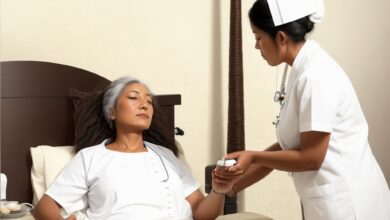
A Brief Glance at History and Importance
Nursing in Sri Lanka, a noble profession with roots going back centuries, has evolved into a critical part of the healthcare system. If you ever wondered how this profession took shape on this beautiful island or how it impacts the lives of everyday people like you and me, then you’re in for a ride. Let’s unravel this tapestry, thread by thread, and explore the world of nursing services in Sri Lanka.
Section I: Overview of Nursing Services in Sri Lanka
A. Types of Nursing Services
1. Hospital Nursing
From bustling cities to serene countryside, hospitals stand as a beacon of hope. And at the heart of these establishments are nurses.
- Registered Nurses (RNs): These are the folks in crisp white uniforms, the ones you might recognize from your favorite medical drama. They’re everywhere, from emergency rooms to neonatal units, bringing care and compassion.
- Licensed Practical Nurses (LPNs): A step closer to the action, LPNs are the unsung heroes performing tasks like administering medication and looking after wounds.
- Specialized Roles: Think of a disease, and there’s probably a nurse specializing in it! From heart diseases to child care, specialization is a big word in the nursing world.
2. Community Health Nursing
When it comes to taking the doctor’s office to the people, community health nurses are the trailblazers. From immunization drives in schools to health talks in community centers, they’re on a mission to keep communities healthy and informed.
3. Home-Based Nursing Care
Ever heard of having a nurse at your doorstep? That’s what home-based care is all about! Whether it’s caring for an elderly family member or helping someone recuperate from surgery, home-based nurses are like extended family members.
- Elderly Care: Growing old is an inevitable journey, but with dedicated elderly care, it doesn’t have to be a lonely one.
- Post-Surgical Care: Those first few days after surgery can be daunting. A home-based nurse turns that uncertainty into assurance with skilled care.
4. Rehabilitative and Palliative Nursing
Life is full of ups and downs, and when health takes a downturn, rehabilitative and palliative nurses step in.
- Chronic Illness Management: From diabetes to heart conditions, managing chronic illnesses requires patience, something these nurses have in abundance.
- End-of-Life Care: The final chapters of life are delicate, and palliative nurses provide a comforting presence to ensure those moments are filled with dignity.
B. Education and Training for Nurses
Education builds the backbone of nursing. From scrubbing in for their first surgery to comforting a child, nurses learn the ropes through a blend of education and training.
1. Nursing Schools and Universities
- Diploma Programs: Think of this as the gateway to the world of nursing. Diploma programs offer a solid foundation.
- Degree Programs: Want to dig deeper into the world of nursing? Degree programs are your best bet.
- Specialized Certifications: From pediatrics to geriatrics, specialization opens doors to exciting opportunities in nursing.
2. Training Hospitals and Clinics
- Internships: Remember your first job? Nurses, too, get their first taste of real-world medicine through internships.
- Residencies: This is where the magic happens! Residencies turn fresh graduates into seasoned professionals.
Hang tight, because we’re about to explore the legal and ethical tapestry that binds this noble profession. Licensing, ethics, and more await in the next section.
Continuing the journey, we’ll now dive into the regulatory framework and ethical considerations that shape the world of nursing in Sri Lanka. Buckle up, as this part will shed light on the rules, regulations, and principles that govern this essential profession.
Section II: Regulations and Ethical Considerations
A. Licensing and Accreditation
1. Licensing Authorities
You wouldn’t want just anyone taking care of your health, would you? Licensing ensures that only qualified individuals wear the nurse’s cap.
- Application Process: Just like applying for a driving license, there’s paperwork, exams, and checks involved. But worry not, it’s all for a good cause.
- Renewal Requirements: Licenses aren’t forever. Just like your favorite subscription service, they need renewing. Nurses must keep up-to-date with best practices, which helps ensure quality care.
2. Accreditation of Nursing Schools
Ever wondered how schools that teach nursing maintain their standards? Enter accreditation.
- Standards and Criteria: There’s a blueprint that all nursing schools follow. Whether it’s the curriculum or the faculty, everything must meet certain standards.
- Monitoring and Evaluation: Think of this as a report card for the schools. Regular checks ensure that they are up to the mark.
B. Ethical Considerations
Nursing isn’t just about medical knowledge; it’s also about trust, empathy, and integrity. Let’s explore the ethical side of the story.
1. Patient Confidentiality and Rights
- Consent: You wouldn’t want someone rummaging through your personal life, would you? In nursing, consent isn’t just a courtesy; it’s a necessity.
- Privacy Laws: Just like your online data, your health information is private. Nurses are guardians of this sensitive information, bound by laws that ensure privacy.
2. Professional Ethics and Conduct
- Code of Ethics: Nurses follow a moral compass, a set of principles that guide their actions.
- Scope of Practice: Ever heard the phrase, “Jack of all trades, master of none?” In nursing, it’s essential to know one’s boundaries and areas of expertise.
Section III: Challenges and Opportunities
Life’s a roller coaster, filled with ups and downs. Similarly, the nursing field in Sri Lanka has its highs and lows. Let’s take a peek behind the curtain and explore both sides of the coin.
A. Current Challenges
1. Staffing and Resources
- Urban vs. Rural Disparities: While city hospitals buzz with activity, rural areas often feel left behind. Bridging this gap is a challenge worth solving.
- Impact of Global Health Crises (e.g., COVID-19): Global pandemics turn challenges into crises. The recent events have shown us the bravery and resilience of the nursing community.
2. Technology Integration
- Digital Record-Keeping: In an age where you can order dinner with a click, healthcare too is going digital. But this transition isn’t without its bumps.
- Telehealth: Remote care sounds futuristic, doesn’t it? While it’s making strides, the road to fully integrating technology into healthcare is still under construction.
3. Cultural and Societal Factors
- Gender Roles in Nursing: Society often paints professions with a broad brush. Breaking stereotypes in nursing is both a challenge and a necessity.
- Public Perception and Trust: Trust isn’t given; it’s earned. Building public trust in the healthcare system is a journey, not a destination.
As we wind our way through the intricate landscape of nursing services in Sri Lanka, we come to a thrilling crossroad where challenges meet opportunities. Yes, the journey has had its fair share of bumps, but wait until you see what the future holds!
B. Opportunities and Innovations
1. Technological Advancements
In a world where your phone recognizes your face, technology is weaving its magic in the healthcare sector too.
- AI and Machine Learning: Imagine a world where computers aid in diagnosing diseases. Sound like sci-fi? It’s happening right now!
- Mobile Health: Your phone isn’t just for selfies anymore. Mobile health apps are putting healthcare right into the palms of people’s hands.
2. Community Outreach and Education
Ever wish that healthcare could come to your doorstep? Well, the future is knocking!
- Public Health Campaigns: From leaflets to local gatherings, healthcare education is stepping out of the hospital and into the community.
- Health Literacy Programs: Knowledge is power, and when it comes to health, it’s a superpower. Programs aimed at educating the masses are turning ordinary folks into health-conscious citizens.
3. Global Collaboration and Standards
They say two heads are better than one, and in healthcare, collaboration spells success.
- International Partnerships: Sri Lanka isn’t alone in the healthcare journey. Partnerships with countries around the world bring new insights and innovations.
- Adoption of Global Best Practices: Why reinvent the wheel? Learning from global success stories can speed up progress and lead to exciting breakthroughs.
Conclusion
And here we are, at the end of a journey that took us through the nooks and crannies of nursing services in Sri Lanka. From the proud history to the promising future, we’ve explored the world of nurses, those unsung heroes who stand at the very heart of healthcare.
A Summary of the Journey
We’ve seen the various faces of nursing, from hospital care to community outreach. We’ve peeked behind the curtain to understand the education and ethics that shape this noble profession. The road wasn’t always smooth, with challenges like staffing shortages and technological hurdles, but the future looks bright and promising.
The Future Awaits
Imagine a Sri Lanka where healthcare is not just a privilege but a right, where nurses aren’t just caregivers but trusted friends, where technology and innovation turn dreams into reality. It’s a future worth striving for, a future where we all have a part to play.
Your Call to Action
Whether it’s pursuing a career in nursing, supporting healthcare initiatives, or simply spreading awareness, we all have a role in shaping the future of healthcare in Sri Lanka. So what’s your part going to be?




